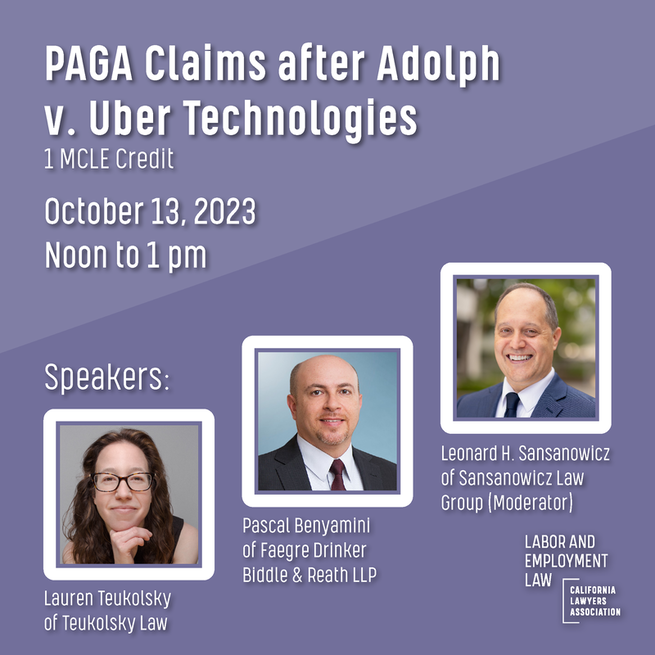|
Lauren Teukolsky was quoted in a Wednesday Bloomberg Law article about a recent Ninth Circuit opinion that discuss the effects of the California Supreme Court’s decision in Adolph v. Uber on PAGA cases proceeding in federal court. The Ninth Circuit ruled that federal courts are bound to follow the California Supreme Court’s interpretation of PAGA standing, and do not need to follow the U.S. Supreme Court’s mistaken interpretation of PAGA standing in its 2022 Viking River Cruises decision.
In the Circuit Court’s decision, Judge Kenneth Kiyul Lee stated in his concurring opinion that arbitration proceedings under PAGA may not constitute a “full and fair opportunity to litigate,” thus offering a potential exception to arbitration proceedings’ preclusive effect on their associated court proceedings. In other words, if an employer were to receive a worker-friendly ruling from an arbitrator, that ruling may not have bearing on the analogous issues the employer is litigating in court. How much of an effect Judge Lee’s opinion will have on California’s employment law landscape is still unclear. In Bloomberg Law’s article, Ms. Teukolsky says that the state’s appeals courts are still divided on the issue and have yet to “’squarely’” consider whether individual PAGA arbitration findings will impact group PAGA claims. “’It’s too soon,’” Ms. Teukolsky says in the article. The article also includes Ms. Teukolsky’s commentary on how Judge Lee’s opinion might be interpreted for the benefit of workers: “The logic in Lee’s concurring opinion could also help claimants wield the ‘full and fair opportunity to litigate’ argument against adverse arbitration findings when their group PAGA claims unfold in court, Teukolsky said.” Ms. Teukolsky has represented workers for over two decades and her commentary on the latest developments in employment law is regularly featured by major publications such as Bloomberg Law, Law360, Law.com, and the Los Angeles Times. To access the Bloomberg Law article in its entirety, click here. To learn more about Ms. Teukolsky’s practice and get in touch with the firm, click here.
0 Comments
On Tuesday, October 10th, Lauren Teukolsky will appear on an MCLE webinar hosted by the California Lawyers Association (CLA). The program is titled, “PAGA Claims after Adolph v. Uber Technologies,” and will unpack how the California Supreme Court’s summer ruling in Adolph will affect claims under California’s Private Attorneys General Act (PAGA). Ms. Teukolsky will speak alongside Pascal Benyamini, a Labor and Employment partner at Faegre Drinker Biddle & Reath LLP. Leonard H. Sansanowicz, founder of Sansanowicz Law Group, will moderate the discussion.
Ms. Teukolsky is a frequent speaker on employment law topics. In September Ms. Teukolsky was selected to moderate a session at CELA’s (California Employment Lawyer Association) 36th Annual Employment Law Conference. In the months prior to the conference, she discussed PAGA claims in a pair of webinars for the Alameda County Bar Association and Beverly Hills Bar Association. Her commentary on the effects of Adolph on PAGA claims was also recently featured in articles by Bloomberg Law and Law.com. CLA is a nonprofit, voluntary bar association serving thousands of licensed attorneys throughout California. Its Labor and Employment Law Section serves as a networking and educational forum for California’s labor and employment lawyers and non-lawyers with an interest in the field. The Tuesday program will begin at 12 pm PT. For information on how to attend the program, click here. To learn more about Ms. Teukolsky’s work, click here.  Lauren Teukolsky was quoted by Bloomberg Law and Law.com in a pair of articles this week on the CA Supreme Court’s Monday decision in Adolph v. Uber Technologies, Inc.. In the highly anticipated ruling, the Court held that the state’s workers could continue to pursue representative PAGA labor claims even if their individual labor claims were forced into arbitration. The Court’s ruling is considered a huge win for California’s workers. PAGA (Private Attorneys General Act) is a state law that authorizes employees to collect civil penalties for violations against themselves and their coworkers on behalf of California’s Labor Commissioner, which has struggled to manage a backlog of cases for the past several decades. Arbitration is a private dispute resolution process that overwhelmingly favors employers and shields corporations from public scrutiny and accountability. Employers frequently require their employees to sign agreements stipulating that all claims made by them will be resolved in private arbitration as opposed to being litigated through the courts, a process that is public and more favorable to workers. A ruling in Uber’s favor would have made it very difficult to bring PAGA cases forward – due to the prevalence of arbitration agreements – and would have seriously eroded workers’ ability to enforce the state’s labor laws. Uber’s lawyers have indicated that the company is considering appealing the Court’s decision. According to analysis Ms. Teukolsky published on LinkedIn, the U.S. Supreme Court is unlikely to hear such an appeal, especially in light of its 2022 decision in Viking River Cruises, Inc. v. Moriana. She said, “It's unlikely SCOTUS will hear a case from a state supreme court involving entirely state-law issues; there must a federal question involved.” Ms. Teukolsky has represented workers for over two decades and her commentary on the latest developments in employment law is regularly featured by major publications such as Bloomberg Law, Law360, Law.com, and the Los Angeles Times. To access the Bloomberg Law article in its entirety, click here. To access the Law.com article in its entirety, click here.  Lauren Teukolsky’s commentary was featured in a recent Law360 article on the Ninth Circuit’s recent ruling that California’s A.B. 51 is preempted by federal law. AB 51 prohibited employers from forcing employees to give up their civil rights, such as the right to a jury trial and the right to appeal an adverse decision, as a condition of employment. The ruling, a reversal of the Ninth Circuit’s own prior decision in 2021, is a significant blow to the state’s workers. California Governor Gavin Newsom signed A.B. 51 into law in 2019, making it illegal for employers to force individuals to waive their right to bring civil rights cases in court as a condition of employment. Arbitration agreements typically stipulate that all claims made by workers—regardless of their severity—must be resolved under private arbitration, a process that overwhelmingly favors employers, disproportionately harms historically marginalized communities, and shields corporations from public scrutiny and accountability. A.B. 51 was meant to ensure that employees were not coerced into signing away their rights, and that all waivers of these significant rights were voluntary. Last year, a three judge Ninth Circuit panel voted to revisit a 2021 decision in which it partially reversed an injunction that stopped California from enforcing A.B. 51. Last month, the panel found that the Federal Arbitration Act preempted A.B. 51, nullifying the law in most situations and allowing California’s corporations to once again force workers to sign arbitration agreements waiving their civil rights. Law360’s article features analysis and advice from management-side and workers- side attorneys on how corporations and workers’ advocates should respond to the Ninth Circuit’s decision. In the article, Ms. Teukolsky advises plaintiffs’ lawyers to be extremely cautious when advising clients on arbitration agreements: "’Plaintiff-side employment attorneys need to think very carefully before they advise an employee to refuse to sign one of these arbitration agreements,’ Teukolsky said. ‘I think you need to advise them: you may lose your job over this. Is that a risk you're willing to take?’" Ms. Teukolsky speaks from experience: she filed one of the only cases under A.B. 51 after her client was fired for expressing opposition to signing away her rights. To read the article in its entirety, click here. For the Court’s opinion holding that A.B. 51 is preempted, click here. If you have concerns about an arbitration agreement your employer has recently asked you to sign, click here to get in touch with our office.  Last week, Bloomberg Law cited research by Lauren Teukolsky in an article about oral arguments in Moriana v. Viking River Cruises, Inc., a pivotal Supreme Court case that was sent back to the California Court of Appeal for further action. The appellate court’s decision could have vast repercussions for lawsuits brought under the Private Attorneys General Act (“PAGA”). Since SCOTUS’s Viking River decision, Ms. Teukolsky’s research shows that California courts have consistently rejected employer arguments that representative PAGA claims must be dismissed once the “individual” component of the plaintiff’s PAGA claim has been sent to arbitration. Bloomberg Law’s article states: “California trial courts dismissed representative claims after moving individual claims into arbitration in just six of 75 decisions collected and analyzed by Lauren Teukolsky of the plaintiff-side firm Teukolsky Law APC. Bloomberg Law independently reviewed those decisions.” Ms. Teukolsky’s updated numbers show an even greater trend in favor of employees. Viking River and the fate of PAGA have been on the forefront of labor and employment experts’ minds for the past several years. In addition to her commentary on the issue for news outlets such as Bloomberg Law and the Daily Journal, Ms. Teukolsky has also discussed the implications of Viking River on a panel for CELA, a statewide organization that works to protect and expand the legal rights of workers, as well as for the College of Labor and Employment Lawyers, the preeminent peer-selected organization of labor and employment lawyers in the United States. To read the article on Bloomberg Law, click here. To get in touch with Teukolsky Law, click here.  Lauren Teukolsky’s commentary was featured in a recent Law360 article discussing how California plans to handle wage complaints stemming from the collapse of Silicon Valley Bank (SVB). SVB catered to the tech industry for decades before collapsing and being seized by regulators on March 10, 2023. Its collapse made it the largest lender to fail since the 2008 financial crisis and left many of its depositors scrambling to make payroll. Following SBV’s collapse, the California agency that enforces the Labor Code sent an email to employment defense firm Littler Mendelson providing them with assurances that any employers affected by the bank collapse who attempted in good faith to make payroll would not be subject to penalties for late wage payments. The agency said that it would divert any claims filed by employees under the Private Attorneys General Act (“PAGA”) related to the bank collapse, effectively preventing private lawsuits against employers from moving forward. While employers and management-side law firms breathe a sigh of relief, workers’ attorneys have voiced concerns that employees need similar protections because many of them live paycheck to paycheck and may default on their own obligations if they don’t get paid. Employees may not be able to pay rent or make minimum payments on credit card bills, leading to the imposition of monetary penalties. The bank failure raises the question: who should bear the risk of a bank default, the employer who controls where the funds are kept, or the employee? Law360’s article states: “’Banking crises generally can lead to significant impacts on workers,’ said Lauren Teukolsky of Teukolsky Law. ‘It's all well and good for the LWDA to say that employers will be protected. I would like to see similar kinds of protections for employees.’ Teukolsky added, ‘Bank failures are not novel at this point, and so I would hope that employers have some contingency plan for having some cash on hand to make their next payroll.’” To read the Law360 article in its entirety, click here. To get in touch with Teukolsky Law, click here.  Lauren Teukolsky’s commentary was featured this week in a Bloomberg Law article on a pending case before the California Supreme Court, Adoph v. Uber Techs, Inc. The case is being closely monitored by both employee-side and management-side attorneys because of its potential ramifications for PAGA (Private Attorneys General Act) litigation. In the case, California’s highest court will decide whether aggrieved employees maintain standing to bring “non-individual” PAGA claims against their employers on behalf of similarly aggrieved employees when their individual claims are sent to arbitration, a private, quasi-court forum that is favored by employers. If the Court rules that such employees maintain their standing, it will clear the way for many employees to continue enforcing the state’s labor laws through PAGA, a 2004 state law that authorizes employees to collect civil penalties for violations against themselves and their coworkers on behalf of California’s Labor Commissioner, which has struggled to manage a backlog of cases for the past several decades. If the Court rules in Uber’s favor, the outlook for the state’s employees would not be so favorable. The Bloomberg Law article states: “A ruling in favor of Uber allowing claims to be split into individual and non-individual components could make it more difficult to bring PAGA cases forward, said Lauren Teukolsky, a plaintiff’s lawyer and founder of Teukolsky Law in Pasadena, Calif. ‘It’s going to make PAGA litigation much more cumbersome,’ she said. Teukolsky expects the court to rule this summer or in early fall.” Ms. Teukolsky also discussed why forcing employees to arbitrate claims is detrimental to them: “Teukolsky said that arbitration comes at a cost for employees because they waive their civil rights, such as the right to a jury trial and the right to an appeal, when they are asked to sign an arbitration agreement,” the article states. The case follows the U.S. Supreme Court’s 2022 decision in Viking River Cruises, Inc. v. Moriana in which a concurring opinion by Justice Sonia Sotomayor said that California courts should have the final say in whether employers can force arbitration for representative claims. To read the article in its entirety, click here.  Law.com quoted Lauren Teukolsky in a recent article discussing a California appellate court’s ruling in Wood v. Kaiser. The case holds that workers can use the state’s Private Attorneys General Act (PAGA) to enforce California’s paid sick leave law, (AB 1522). The law requires employers to provide employees with 24 hours of paid sick leave every year. Before the Wood case was decided, it was unclear whether employees could enforce their right to paid sick leave by suing their employer, or whether only the State could bring suit to enforce the law. This is because the sick leave law does not contain a private right of action but only permits enforcement by the State. However, PAGA allows employees to stand in the shoes of the State to bring enforcement actions against employers. Despite this, several lower courts had previously ruled that workers may not use PAGA to enforce the paid sick leave law, leaving workers without any recourse. The Court of Appeals decision in Wood v. Kaiser effectively overrules those decisions, and represents a victory for workers. The article states: “Lauren Teukolsky, an employee-side plaintiffs attorney with Teukolsky Law, said the decision appears to be the first by a California appellate court that specifically addresses the availability of PAGA penalties under the paid sick-leave law. ‘We are all celebrating this victory,’ Teukolsky said in an interview.” Ms. Teukolsky has represented workers for over two decades. Her commentary on the latest developments in employment law has been featured in articles by Bloomberg Law, Law360, and the Los Angeles Times. To read Law.com’s article in its entirety, click here. If you believe your employer may be violating California’s sick-pay laws, click here to get in touch with Teukolsky Law.  Last month, Bloomberg Law quoted Lauren Teukolsky in an article about the differing approaches taken by California Superior Courts and federal courts towards representative Private Attorneys General Act (PAGA) claims in the months since the U.S. Supreme Court ruled in Viking River Cruises, Inc. v. Moriana. In Viking River, the majority held that employers could force arbitration of workers’ individual claims under PAGA, a California law that allows workers to sue companies for employment law violations on behalf of the state. However, the decision was written in a way that essentially left the fate of representative PAGA claims in the hands of California’s lower courts. For the most part, federal courts have strictly adhered to the Supreme Court’s ruling, sending individual claims to arbitration, and dismissing representative PAGA claims in over half of the decisions analyzed by Bloomberg Law. According to research conducted by Ms. Teukolsky, California’s state courts have taken a different tack. The article states: “In sharp contrast, state trial courts dismissed representative claims after moving individual claims into arbitration in just six of 75 decisions collected and analyzed by Lauren Teukolsky of the plaintiff-side firm Teukolsky Law PC. Bloomberg Law independently reviewed those decisions […] The trend of state courts not dismissing non-individual PAGA claims is a huge victory for workers in the state of California,” Teukolsky said. The fate of PAGA will likely be decided in Adolph v. Uber, which is currently pending before the California Supreme Court. Ms. Teukolsky is frequently cited in news publications for her commentary on developments in employment law, including a pair of Bloomberg Law and Daily Journal articles in 2022 that featured her commentary on Viking River. Ms. Teukolsky also discussed the case on several panels organized by the Los Angeles County Bar Association, the California Employment Lawyers Association, and the College of Labor and Employment Lawyers, the preeminent peer-selected organization of labor and employment lawyers in the United States. To learn more about Ms. Teukolsky’s experience, click here. To read the article in its entirety, click here. If you believe you’ve been treated unlawfully in the workplace and want to get in touch with our office, click here.  In December, Lauren Teukolsky was quoted in a Daily Journal article discussing the future of California’s Private Attorneys General Act (PAGA) in 2023. PAGA is a California labor law that allows workers to sue their employers for labor violations on behalf of the state. In 2022, the U.S. Supreme Court’s ruling in Viking River Cruises v. Moriana was believed by some to be a victory for employers, preventing employees from asserting PAGA claims affecting multiple employees. However, according to the article, research conducted by Ms. Teukolsky in the aftermath of Viking shows employees have fared well in California state courts: “Superior court judges have rejected defense motions to dismiss PAGA claims for a plaintiff’s co-workers 92% of the time even as they have referred individual claims to arbitration, according to records compiled by Lauren K. Teukolsky of the plaintiff’s firm Teukolsky Law APC. Just six PAGA cases have been dismissed in state court in what she referred to as the ‘full Alito.’” In federal courts, the picture painted by Ms. Teukolsky’s research is not as encouraging for workers. The article states: “Employers have had a lot more success in federal court, where judges have dismissed PAGA claims six of 11 times, she added. But the vast majority of cases – 75, Teukolsky said – have been considered in state court.” Ms. Teukolsky previously discussed the implications of Viking River on panels organized by the Los Angeles County Bar Association, the California Employment Lawyers Association, and the College of Labor and Employment Lawyers, the preeminent peer-selected organization of labor and employment lawyers in the United States. She is also frequently cited in news publications for her commentary on developments in employment law, including a June 2022 Bloomberg Law article that featured her commentary on Viking River. To learn more about Ms. Teukolsky’s experience, click here. To read the article in its entirety, click here. If you believe you’ve been treated unlawfully in the workplace and want to get in touch with our office, click here. |
AuthorLauren Teukolsky is the founder and owner of Teukolsky Law, A Professional Corporation. Archives
June 2024
Categories
All
|
Teukolsky Law, A Professional Corporation, represents clients throughout California. Ms. Teukolsky is admitted to practice in the State of California, as well as the United States Supreme Court, Ninth Circuit Court of Appeals, Northern District of California and Central District of California. Disclaimer.
Copyright © 2017
Copyright © 2017



 RSS Feed
RSS Feed